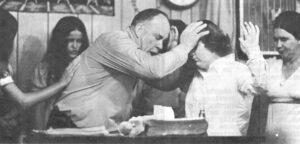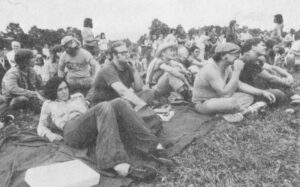David Peyton
- 1975

Fellowship Title:
- Cajun and Appalacian: Two Cultures in Transition
Fellowship Year:
- 1975
“Lache Pas La Patate”: Cajuns In Transition
S.D. Courville is anything but a militant. He’s a furniture salesman, a fiddler, and a Cajun, but he’s not a militant. Yet, a southern Louisiana movement that borders on militancy makes him feel good about who he La. For the first time in his 70 years People outside his “home country” are applauding his music. And in his native region, he is encouraged to speak French; an irony in that one of his early schoolteachers punished him for speaking his mother tongue. Courville has played his fiddle in Montreal and Washington, D.C. Last spring he toured the West Coast with other Louisiana musicians. Their guide was Mike Seeger, a noted folk song expert. “While I was in California, I asked a professor what it was all about,” Courville said, sipping dark roast Cajun coffee at his furniture store in Eunice, La. “Why were people on the West Coast interested in my music? Why were they interested in us Cajuns?” Courville says he was told it was part of a recent upswing in interest among many
Appalachia: Preface for a Dying Culture
Two hundred years have passed since the first white settlers made their early arduous steps into the Appalachian wilderness, but those two centuries have brought America no closer to understanding the people of the Appalachian culture than when the culture was born. The old ways of the mountains are disappearing. In their place are festivals dedicated to the memories, slick commercial extrapolations of the mountain cultures and small, and seemingly ineffectual, groups of “new Appalachians” who desire to see a new culture built on the best of the old values. The future of the culture is clouded. There are those who say the culture is dying, if it is not dead already. The resurgence of interest in Appalachia is but a death rattle, an indication that the real culture is dead and the romantic visions of the culture are about to destroy the remnants. That’s the opinion of Dr. Norman O. Simpkins, chairman of the Department of Anthropology at Marshall University in Huntington, W.Va., and a leading authority on the folk culture of the southern

The Mountain Call: More Than a Newsletter
The road to The Knob really isn’t a road at all. It’s a path, a winding scar in a West Virginia mountain. Boulders as big as horses litter the roadbed. Here and there, mountain springs pour water on the clay base making mud pits that defy even rugged vehicles. When Marrowbone Creek is high, travel comes to a halt since part of the road is a rocky creek bed. It is a two-mile trip from the valley floor to The Knob, but it can require as much as an hour’s driving time, depending on weather conditions. It’s an unlikely place to find an 84-year-old philosopher, two native Californians and an escapee from the concrete canyons of New Jersey. But the dreams that are dreamed on that Mingo County Mountain seem to many to be as farfetched as the people who live there. The four people whose paths have crossed on The Knob are building an extrapolation of the old Appalachian culture. They are choosing the best of the old ways as building blocks for a

In the Army of the Lord: Serpent-Handlers in West Virginia
“And these signs shall follow them that believe; In my name they shall cast out devils; they shall speak with new tongues; they shall take up serpents and if they drink any deadly thing, it shall not hurt them; they shall lay hands on the sick and they shall recover.” St. Mark 16:17,18 (KJV) It is a sultry mid-July evening on Camp Creek in rural Boone County, W.Va. It is Sunday, a day of rest, and all along the tributary of the Little Coal River, families are recovering from the traditional Sunday feast. Many have spent the afternoon on front porches, chatting with friends and relatives. Some will remain there well into the night to catch the cool evening breezes, which seem to tumble down the steep mountains, bringing a respite from the day’s heat. Others will move inside to watch their favorite Sunday TV shows and prepare for the Monday workday. Some will gather their families in cars for Sunday evening services at one of the many small churches that dot the hilly landscape.

The Culture Game: Festivals in Appalachia
“Mountain music will set you free” is a popular message on tee shirts this summer in Appalachia. The slogan expresses the opinion of a rapidly growing cult of mountain culture enthusiasts who gather in scores of places throughout the summer to celebrate the simple joys of Appalachia. But, as the crowds grow, those who seek to preserve mountain heritage say they’re ready to wear tee shirts with the message “Mountain music is getting out of hand.” Some say they’re ready to carry banners proclaiming, “Appalachian culture is its own worst enemy.” Mountain festivals are as common to Southern Appalachia as family gatherings were long ago. But, unlike family reunions, which attracted no more than a handful of clan members, today hundreds or thousands congregate at campsites among rolling hills on private farms and in small mountain towns for weekends of music, crafts and mountain heritage. The popularity of the simple, joyous mountain culture celebration has affected the whole United States. The festivals bring people (particularly the young) into the mountains from all parts of the
